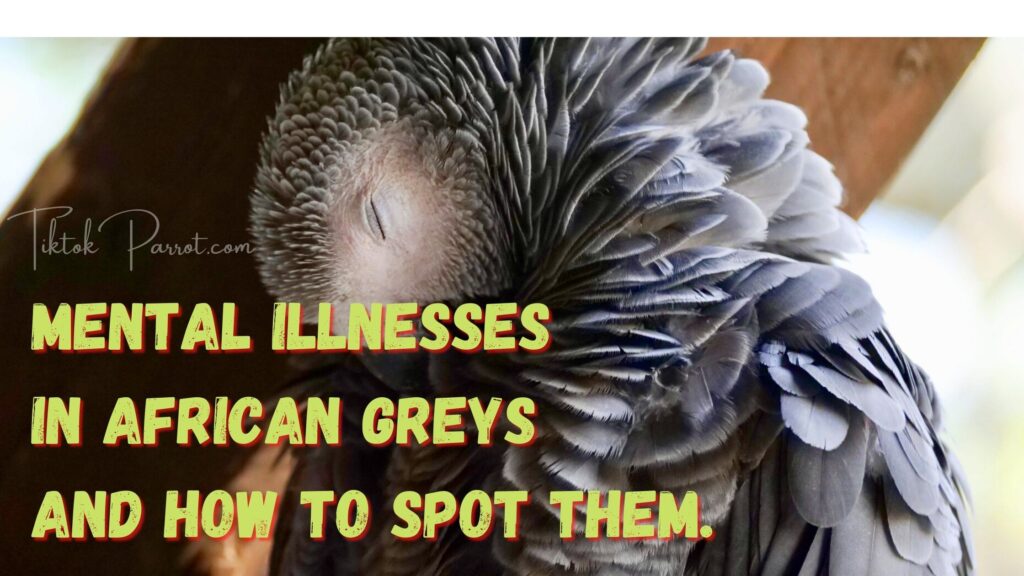African Greys are one of the most popular pet birds in the world. However, they are also one of the most susceptible to mental illness. In this article, we will be looking at some mental illnesses that African Greys suffer from and how to spot them.
Mental illnesses in African Greys can sometimes be difficult to spot because their behaviors mimic those of other bird species’ behaviors. However, there are some telltale signs that you can look for:
As we all know, they are intelligent and social animals that can easily learn to mimic human speech. But, like all animals, they can also suffer from mental illnesses.
Some of the common signs of mental illness in African Greys include:
- Changes in vocalizations
- Aggression
- Fearfulness
- Loss of appetite
- Lack of interest in playing with toys
- Lethargy/ Tiredness/ Exhaustion
- Irritability
- Excessive sleeping or insomnia
- Feather picking
- Beak malocclusion
- Obesity/ Overweightness
- Kidney disease
If you see your grey is healthy without any of these signs but still his behavior looks different, then it can be stress as well.
How to keep your Africans grey happy, away from stress;-
If you see your grey is healthy without any of these signs but still his behavior looks different, then it can be stressful as well. Because African greys are very curious and intelligent birds, they can also be quite demanding. They need a lot of stimulation and attention to keep them happy.
The African Grey parrot is a social bird that needs attention and stimulation from its human companion. If you are an African Grey owner, you need to know how to keep your African Grey happy and away from stress.
They need a lot of attention and interaction with their owners. Some ways to keep your African Grey happy from stress include:
-Providing lots of toys for them to play with.
-Offering them plenty of different foods. (Safe food, always double check, make sure food is not harmful, an avocado has killed my beloved bird)
-Giving the birds plenty of space and time out of their cage.
-Spending time with the bird every day.
-Do not keep your grey always in the cage, it can be stressful for the bird.
-Let the bird sit on a nice perch in the corner of your house.
-Grey also need a lot of space to fly around in, which will keep the bird happy.
Summary:-
An African Grey experiencing depression might have less energy, stop socializing with its flock mates, and have an increased appetite.
The bird experiencing anxiety might be more vocal than usual avoids eye contact with people or other birds, or even pluck its feathers.
An African Grey experiencing OCD might exhibit obsessive behaviors such as compulsively chewing on wood or plastic items or pulling out their feathers to the point of injury.
My closing thoughts;
African Greys are no different from humans when it comes to mental illnesses. They can suffer from depression, anxiety, and other mental illnesses.
There are many signs of mental illness in an African Grey parrot. A change in eating habits, social interaction, and vocalization are some common symptoms of a bird with a mental illness.
Mental illnesses in African Greys can sometimes be difficult to spot because their behaviors mimic those of other bird species’ behaviors.
If you notice, something is not usual with your parrot then look for these signs and treat them accordingly.
Also you can check out Common Health Problems of African Greys and The Importance of Animal Behavior and Aggression in Pet Care!
If you found this blog helpful, It would be great if you could share it with your family and friends who might find it useful as well.
For more useful content about African Grey parrots, you can subscribe my site with your email to get notification upon publishing a new blog, the subscribe box you can see on the right side of this page. Also if you get an alert on your web browser while browsing my site, allow it and that will also give you an alert whenever I publish a new blog.
Stay safe and much love !




